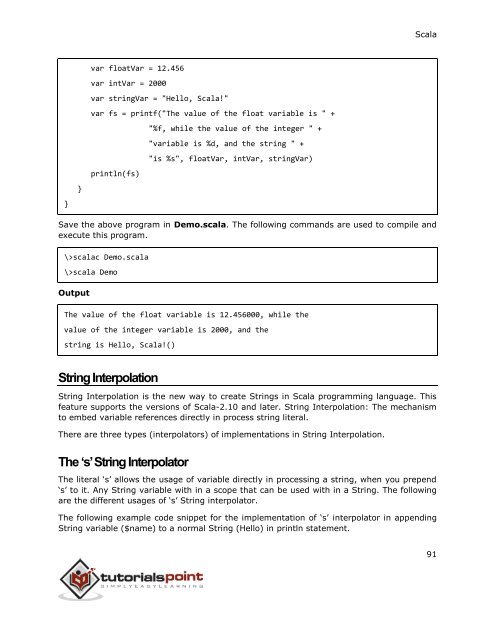You also want an ePaper? Increase the reach of your titles
YUMPU automatically turns print PDFs into web optimized ePapers that Google loves.
Scala<br />
var floatVar = 12.456<br />
var intVar = 2000<br />
var stringVar = "Hello, Scala!"<br />
var fs = printf("The value of the float variable is " +<br />
"%f, while the value of the integer " +<br />
"variable is %d, and the string " +<br />
"is %s", floatVar, intVar, stringVar)<br />
println(fs)<br />
}<br />
}<br />
Save the above program in Demo.<strong>scala</strong>. The following commands are used to compile and<br />
execute this program.<br />
\><strong>scala</strong>c Demo.<strong>scala</strong><br />
\><strong>scala</strong> Demo<br />
Output<br />
The value of the float variable is 12.456000, while the<br />
value of the integer variable is 2000, and the<br />
string is Hello, Scala!()<br />
String Interpolation<br />
String Interpolation is the new way to create Strings in Scala programming language. This<br />
feature supports the versions of Scala-2.10 and later. String Interpolation: The mechanism<br />
to embed variable references directly in process string literal.<br />
There are three types (interpolators) of implementations in String Interpolation.<br />
The ‘s’ String Interpolator<br />
The literal ‘s’ allows the usage of variable directly in processing a string, when you prepend<br />
‘s’ to it. Any String variable with in a scope that can be used with in a String. The following<br />
are the different usages of ‘s’ String interpolator.<br />
The following example code snippet for the implementation of ‘s’ interpolator in appending<br />
String variable ($name) to a normal String (Hello) in println statement.<br />
91


